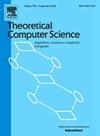Fast exact algorithms for the SAT problem with bounded occurrences of variables
IF 0.9
4区 计算机科学
Q3 COMPUTER SCIENCE, THEORY & METHODS
引用次数: 0
Abstract
We present fast algorithms for the general CNF satisfiability problem (SAT) with running-time bound , where is a function of the maximum occurrence d of variables (d can also be the average occurrence when each variable appears at least twice), and n is the number of variables in the input formula. Similar to SAT with bounded clause lengths, SAT with bounded occurrences of variables has also been extensively studied in the literature. Especially, the running-time bounds for small values of d, such as and , have become bottlenecks for algorithms evaluated by the formula length L and other algorithms. In this paper, we show that SAT can be solved in time for and for , improving the previous results and obtained by Wahlström (SAT 2005) nearly 20 years ago. For , we obtain a running time bound of , implying a bound of with respect to the formula length L.
求助全文
约1分钟内获得全文
求助全文
来源期刊

Theoretical Computer Science
工程技术-计算机:理论方法
CiteScore
2.60
自引率
18.20%
发文量
471
审稿时长
12.6 months
期刊介绍:
Theoretical Computer Science is mathematical and abstract in spirit, but it derives its motivation from practical and everyday computation. Its aim is to understand the nature of computation and, as a consequence of this understanding, provide more efficient methodologies. All papers introducing or studying mathematical, logic and formal concepts and methods are welcome, provided that their motivation is clearly drawn from the field of computing.
 求助内容:
求助内容: 应助结果提醒方式:
应助结果提醒方式:


